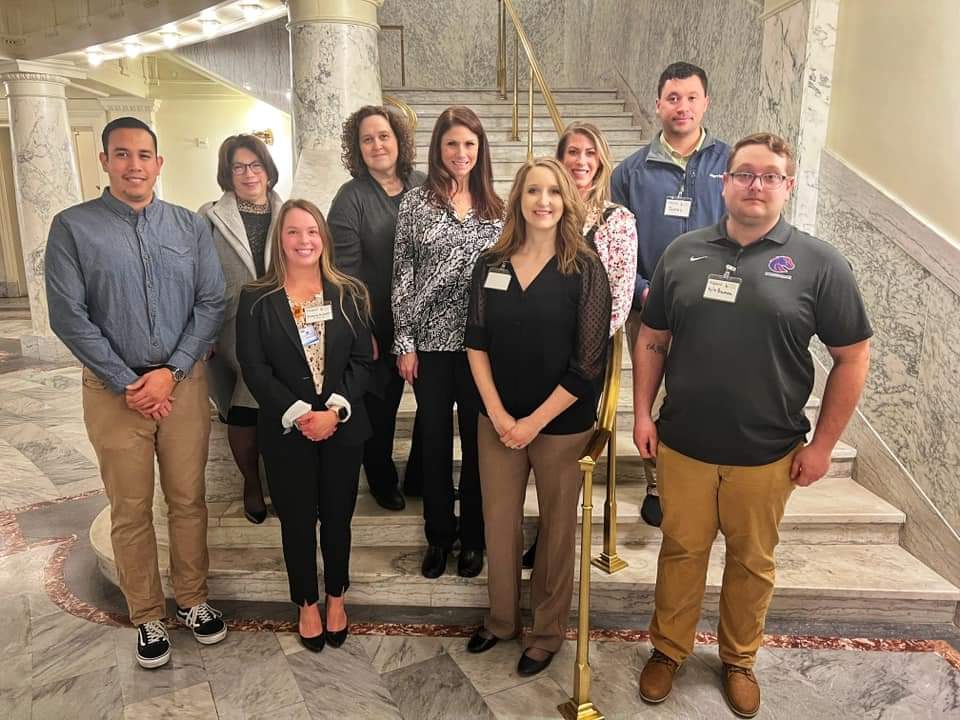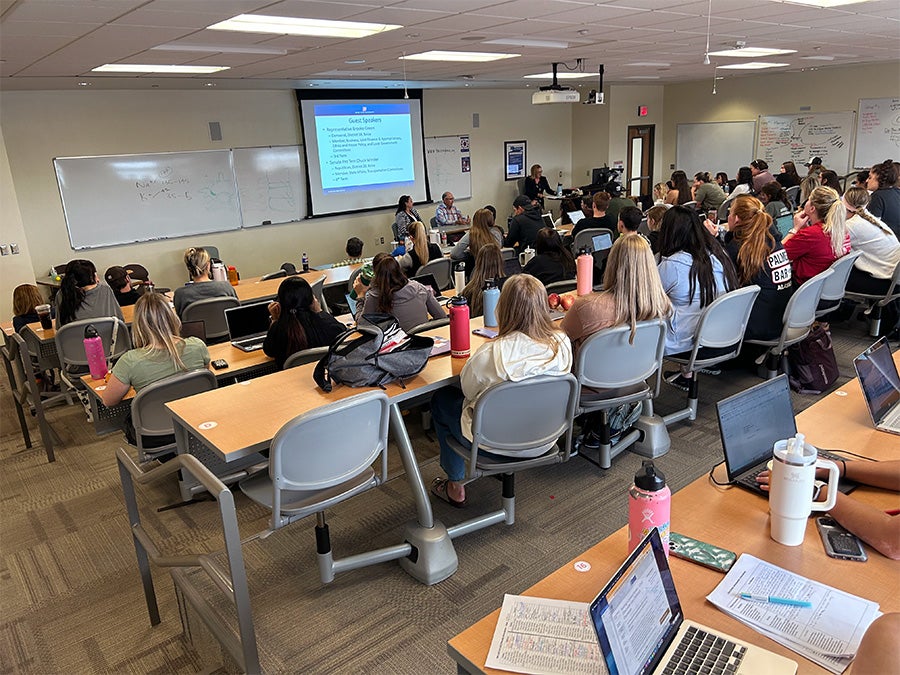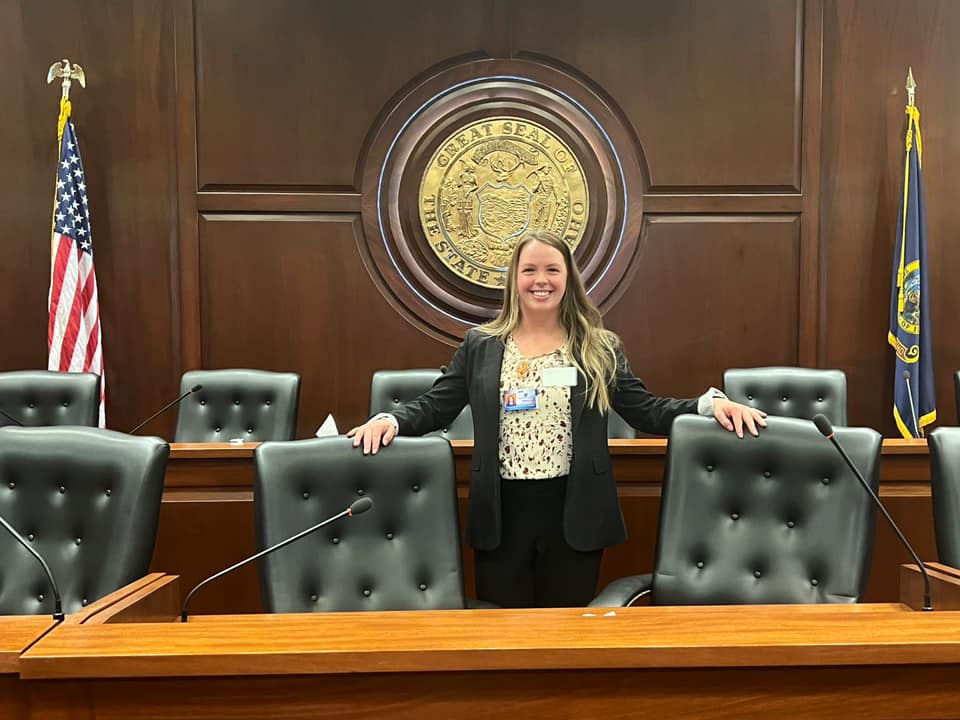What kind of impact could we make if we all spoke up for positive change we believe in? What if, instead of complaining about issues, we leveraged our influence to make a difference?
Adjunct professor Corey Surber is helping senior nursing students consider just that in their “Policy, Power, and Voice” class.
Surber is the Director of Advocacy for Trinity Health (the parent health system for Saint Alphonsus) and she’s been an adjunct in the College of Health Sciences for about 15 years.
“This class is important to the curriculum because it grounds nurses in the importance of paying attention to the world around them, and how public policy affects their work and their patients,” she said.

But the class isn’t just about state and federal public policy, although that is Surber’s wheelhouse. She also covers areas like HIPAA privacy regulations, unconscious biases, tribalism, civil discourse, and how nurses can navigate patient interactions amidst it all.
Perhaps most importantly, Surber emphasizes “nurses’ ability to use their voice.” The class helps students recognize their strengths and how they can use them to build relationships and influence change. And Surber doesn’t just mean in policy spheres, but within their own employment organizations.
She hopes to see them empowered “to make change where they think it’s needed rather than just gossiping about it in the break room or being frustrated about it,” she said. “If you’re not getting involved in using your voice, then you kind of lose your right to sit and gripe about it.”
“I was surprised by how much this class helped prepare me to be an advocate for change,” said senior Brittany Braislin. She took the class last semester and is now Surber’s teaching assistant. “Whether you are attempting to change something at a systems level, or governmental level, it was shown to me how important it is to have data available as well as strength in numbers,” she said.
Bridging policy-making and the classroom
In her full-time position, Surber covers government relations in Idaho and Oregon at the federal, state and local level. Her role as an instructor bridges the gap between the policy-making front lines and the classroom, helping students better understand the policy process, their potential role in it and just how much lawmakers want to hear from nurses.

She capitalizes on her professional network, bringing in guest speakers from Idaho’s legislative branch. “It makes it possible to get speakers in front of them that they normally wouldn’t see, as a nursing student,” Surber said.
This semester, students heard firsthand from both major political parties, and both arms of Idaho’s state legislature, when Rep. Brooke Green and Senate President Pro Tem Chuck Winder visited class.
Surber also teaches students about how easy it is to stay aware of political happenings, informing students of resources and associations that can provide them with relevant policy updates, and how to get involved as a citizen advocate.
“There’s a lot of perception that if you’re out there trying to influence policy, that you’re a lobbyist. But there’s a big distinction,” she said. “If you’re a lobbyist, you’re paid to represent a position. If you’re a citizen advocate, you’re representing yourself.”
A day at the Capitol
When Surber teaches the class in spring semesters, she gives students the opportunity to participate in the American Nurses Association’s Nurses Day at the Idaho Capitol Building. Students receive a tour of the building, sit in on committee meetings and visit with legislators. They also network with nurse leaders and managers from local hospital systems, as well as leaders from Idaho’s branch of the American Nurses Association.

Last year, a group of nurses and students also spoke with Lieutenant Governor Scott Bedke. “It was huge for them,” Surber recalled. “He basically said, ‘We want to hear from nurses; what questions do you have for us?’”
Braislin, Surber’s teaching assistant this semester, took the class in spring 2023 and attended the event. She didn’t expect to speak at all, but at the encouragement of Surber and other nurses around her, she did. She shared her take on the issue of nurses’ pay and staff shortages from her experiences in clinical rotations, which was most welcome.
“Nurses Day at the Capitol was a very powerful day to be a part of,” she said. “After the meeting ended, I was commended for speaking up and using my own experience to talk about something that I knew was affecting healthcare and the nursing field.”
“Honestly, I have never felt so empowered like that by a group of strangers,” she said. “It was truly an incredible feeling.”
Read more about her experience
Guest lecturer brings essential de-escalation education
Unfortunately, not all advocacy falls in positive contexts. It would be irresponsible to educate nurses and not acknowledge the rising violence in their workplace. Here Surber relies on the expertise of Tyler Kerns.
Kerns is a licensed professional counselor and a Violence Prevention and Education Consultant with Saint Alphonsus. He’s been visiting Surber’s class for the last five years educating students on de-escalation strategies, ways to keep themselves safe and advocate for themselves in the workplace.
“We’re having frank conversations about less pleasant aspects of patient care,” Kerns said. “I always tell them ‘Violence is something that happens in healthcare, but it’s not a part of healthcare.’”
Kerns structures his class as a casual conversation instead of a lecture or presentation. He teaches practical therapeutic conversational strategies, empowering students with both the ability to identify early signs of an individual escalating and the tools to calm them down.
Unfortunately, many student nurses have encountered this kind of behavior in clinicals by the time he talks with them in their final semester. Yet Kerns said many students get very engaged in the class; they offer examples from their own experiences and discuss together potential ways to apply de-escalation tactics. He is encouraged by the fortitude of new nurses he meets across the valley.
“I’ve really been impressed by the empowerment and the ability of new nurses to speak up and say ‘That’s not okay,’” he said.
Lasting impact of the class
Both Kerns and Surber have noticed the lasting effect this class has on nursing students. Surber frequently reads course evaluations from students who began the semester questioning its point, but who end up viewing the class as valuable to their education.
“For some of them, it lit a fire under them because there was an issue that they really cared about,” Surber said. “It’s really rewarding to cross paths with them later and see them out there doing great things.”
Kerns agrees. When he encounters Boise State alumni hired by Saint Alphonsus, he said they’re often confident and enthusiastic, recalling his workshop with gratitude.
“[Boise State’s] program is excellent, not just by metrics within academics, but seeing the caliber of nurses they’re able to turn out,” he said.
“After completing this class, and then coming back to be a Teaching Assistant for it, I have learned even more about the connections nurses have with the larger picture,” Braislin said.
“This class helped me navigate health policy and its nuances, how to be involved in, or start working towards, organizational changes, and how to have a voice for change.”
Brittany Braislin
“I challenge future nursing students who take this class to not dwell on some of the political aspects of this class, but more so on the connections and ideas these assignments and guest speakers have on real-life issues and how you can model those behaviors and ideas,” Braislin said.